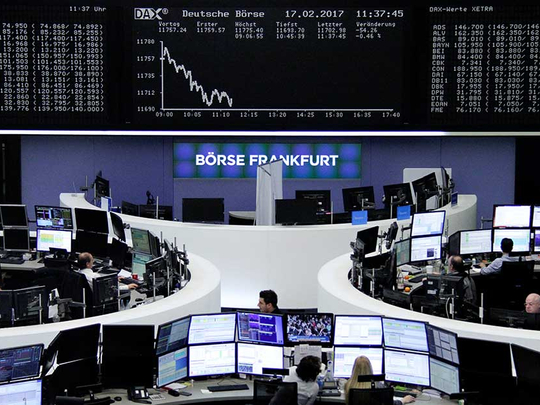
London: Global equity markets were set to end the week on a softer footing on Friday, after setting record highs in the previous two sessions, as investors looked for clarity on US President Donald Trump’s tax and trade policies.
The MSCI All-Country World index was still headed for its fourth straight week of gains after rising to a record high on Thursday, buoyed by positive signs for global economic growth. But Asian and European markets eased as investors cashed in recent gains.
MSCI’s index of Asia-Pacific shares outside Japan pulled back 0.2 per cent, Tokyo stocks closed down 0.6 per cent and the pan-European STOXX 600 index was 0.3 per cent lower, although it remained near its highest level in 13 months.
European stocks have benefited from positive earnings surprises and a surge in merger and acquisition deals, with US food company Kraft’s bid to merge with Britain’s Unilever the latest in a string of deals.
With more than half the STOXX 600 companies reporting, 55 per cent had beaten forecasts.
“As long as the fundamentals and the earnings story continue to carry through, there’s a reason to be invested in these stock markets,” said Nandini Ramakrishnan, global market strategist at JPMorgan Asset Management.
The lure of record-high world stock markets gave funds that only bet on rising prices their first weekly inflows in a year, figures from Bank of America Merrill Lynch showed on Friday.
Losses
US equities futures indicated a weaker open for the Dow Jones, Nasdaq and S&P 500 indexes, down 0.2 to 0.3 per cent.
Although the dollar was 0.2 per cent firmer on the day, it was hovering near a one-week low against a basket of currencies and headed for its sixth week of losses in the last eight, as investors awaited substantive market-friendly news from President Donald Trump on tax reform.
The greenback hit a one-month high on Wednesday after US Federal Reserve Chair Janet Yellen supported a near-term rate increase due to signs of robust economic growth.
Junichi Ishikawa, senior forex strategist at IG Securities in Tokyo, said the dollar’s recent bounce lacked conviction.
“This shows that the market is still trying to work out the implication of President Trump’s policies, of which his approach to trade may not be supportive for the dollar,” he said.
Sterling fell half a per cent to $1.2427 after data showing retail sales in Britain fell 0.3 per cent month-on-month last month, against expectations for a 0.9 per cent rise, indicating consumers’ spending appetite was feeling a Brexit bite as inflation picked up.
Euro debt yields dip
Bond yields slipped pretty much across the board. Yields on US Treasuries, the benchmark for global borrowing costs, were at 2.41 per cent, after rising during the week on US rate hike speculation. Yields on German Bunds, Europe’s benchmark, were down 4 basis points at 0.3 per cent.
Developments in the French presidential election continue to surprise bond markets. The premium that investors demand to hold French instead of German government bonds shot higher on Friday after French leftist leaders suggested they may cooperate in upcoming elections.
That increases their chances of facing Euro-sceptic Marine Le Pen on May 7, heightening uncertainty about who would win the presidency.
Safe-haven Bunds and other core countries like France and Austria have seen yields rise this week, but Spain and Italy have seen theirs fall for the first week in five, helped by some soothing noises from the European Central Bank.
Gold was set for its third week of gains as political uncertainty spurred demand for the safe haven precious metal. It was down 0.2 per cent on the day.
Brent crude futures were down 0.5 per cent, paring back earlier gains. Opec sources told Reuters the producers’ club could extend its output cut in order to rein in global oversupply.
Copper was set to end the week lower as profit-taking pared back the price of the three-month copper contract, though concerns over supply from Chilean and Indonesian mines remained.












